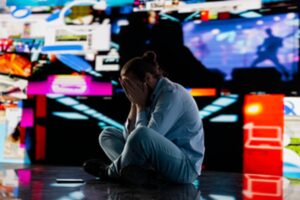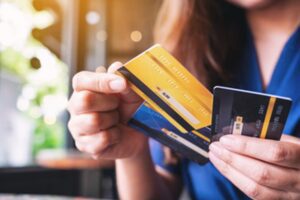You may just be an emotional spender if you love spending money to feel better. If you have ever heard the term “retail therapy,” you may just have a spending problem.
Emotional spending can wreak havoc on your wallet, your relationships, and even your life. It’s imperative to get control now before things get out of control. We have some good tips to help you stop your impulse buying.
Here are the key indicators you are an emotional spender, and what you can do to fix it:

What is an Emotional Spender?
Emotional spending is when a consumer spends money in order to satisfy an emotional need. When emotions are heightened, such as stress, grief, or boredom they purchase goods.
Emotional spending results in impulse purchases to essentially “feel better.” Many people can land in treacherous waters should their emotional spending get out of control. If it goes unmonitored, it can have negative impacts on your finances—and your life.
Are You an Emotional Spender?
There are several key indicators that can tell you if you are an emotional spender. It’s wise to be on the lookout for these signs so you can prevent financial and lifestyle implications from spending gone awry.
Here are the top signs you are an emotional spender:

You shop to reward yourself.
If every time something good or bad happens in your life, you go shopping, you may be an emotional spender. Many emotional shoppers use shopping as a reward mechanism or stress release.
Although it’s fine to treat yourself occasionally, constantly buying things you don’t really need, but only want, can wreak havoc. This habit can lead to excessive clutter and high debt. This debt can carry over into your future and upset any future spending plans you may require down the road.
Shopping as therapy.
You undoubtedly have heard the term “retail therapy.” This means that every time you feel stressed, you run out to buy an item you really don’t need.
Shopping can deliver a temporary dopamine dose, which elevates your mood. According to a Journal of Consumer Research survey, 62% of people use retail therapy to feel better. This is a clear sign of emotional spending.

You shop to reward yourself.
If every time something good or bad happens in your life, you go shopping, you may be an emotional spender. Many emotional shoppers use shopping as a reward mechanism or stress release.
Although it’s fine to treat yourself occasionally, constantly buying things you don’t really need, but only want, can wreak havoc. This habit can lead to excessive clutter and high debt. This debt can carry over into your future and upset any future spending plans you may require down the road.
Shopping as therapy.
You undoubtedly have heard the term “retail therapy.” This means that every time you feel stressed, you run out to buy an item you really don’t need.
Shopping can deliver a temporary dopamine dose, which elevates your mood. According to a Journal of Consumer Research survey, 62% of people use retail therapy to feel better. This is a clear sign of emotional spending.

Hiding Purchases.
If you go out of your way to hide what you buy, you may have an emotional spending problem. The urge to keep your friends and family in the dark signifies you feel shame or embarrassment for your purchases.
This secrecy stems from fear of judgment and guilt. Being transparent with the people who love you can help keep you accountable. If you are hiding your bags and receipts, it’s time to confront your spending issue.
Cluttered Home.
If your home is cluttered with all your purchases, you may be a victim of emotional purchases. This physical manifestation of clutter can cause serious negative issues in your household and relationships.
By paying attention to the growing accumulation of items, you can nip it in the bud. If your closets and other home spaces are cluttered, it’s time to look at your spending habits and make a healthy change by putting away your credit cards.

Comparing Yourself.
Comparing yourself to others and what they have is a strong motivator to overspend. The newest trends, influencer picks, and celebrity-endorsed items can fuel a spending habit. This can lead to high debt and a fractured peace of mind.
Social media can greatly influence you to make impulse purchases to stay on trend. If your desire to “keep up with The Jones” is causing you to spend money on things you do not need, you have an emotional spending problem.
Impulse Purchases.
Impulse purchases are emotion-driven and can hit your bank account hard. Unplanned buying on a whim can lead to regret later.
Financial guru Dave Ramsey was recorded stating, “Rationalizing unnecessary buys is a common trait among emotional spenders who seek immediate gratification.” Immediate gratification leads to future devastation.

Dependency on Credit Cards.
If you are heavily dependent on credit cards, you could be led down the path to emotionally buying items. When your bank balance is low, it’s easy to grab the credit card and “deal with it later.”
Unfortunately, that warped logic will ultimately lead into future debt and headaches. This exacerbates stress and likely leads to even more spending. According to Experian, the average person in the U.S. has a credit card balance of over $6,700.
Deal Chasing.
If you are constantly on the lookout for the next good deal or annual sale, you could have a spending issue. Although you may believe you are saving money, you are actually spending more money than if you had not shopped in the first place.
Yes, you can receive an emotional boost, but it usually causes harm in the end. Bargain hunting can provide a thrill, but it results in money issues and guilt afterward.

How to Curb Emotional Spending.
All hope is not lost, as you can curb your emotional buying habits. Here are the best ways to prevent yourself from buying unnecessary items and protect your pockets:
- Practice the 24-hour rule to see if the spending urge passes.
- Create and stick to your budget.
- Only purchase necessities, not stuff you want or impulse buys.
- Identify your triggers and talk to yourself before buying things.
- Find healthier coping mechanisms such as walks, going to the movies, or treating yourself to a cup of coffee. These treats won’t break the bank!
- Remove temptation by removing your credit cards from your wallet.
- Set strict rules on credit card use. Don’t buy anything over $20.
Bottom Line.
Emotional spending can cause long-term damage to your finances, relationships, and overall quality of life. If you find yourself comparing yourself to others and impulse buying, buying things when you are stressed, or to celebrate, and hiding your purchases, you may have a spending problem.
If your home is cluttered and you are dependent on your credit cards, it’s time to reflect on healthier coping strategies. Using shopping as therapy is a dangerous game and can land you in deep debt and financial issues in the future. By identifying the issues and addressing them, you can gain control of your emotional spending problem.




